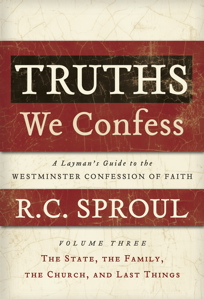
R.C. Sproul
Reviewed by: G. I. Williamson
Truths We Confess: A Layman’s Guide to the Westminster Confession of Faith, vol. 3, by R.C. Sproul. Published by P&R Publishing, 2007. Hardback, 281 pages, list price $25.00. Reviewed by OP minister G. I. Williamson.
This volume completes Dr. Sproul’s commentary on the Westminster Confession of Faith, covering chapters 23-33. However, the last 82 pages are simply a reprinting of the Larger and Shorter Catechisms. But still, the 199 pages of commentary are well worth reading, and I often find myself agreeing even with seemingly controversial statements.
Here is a good example. Commenting on chapter 32.1, Dr. Sproul says:
Volumes of theological information about eschatology have been compacted and condensed in this short paragraph. It assumes that the human soul has an immortal subsistence. An immortal soul is not mortal and therefore cannot die or be destroyed....However, I am troubled by the word immortal because of the baggage it carries from ancient Greek philosophy, in which the soul was seen as eternal inherently and intrinsically immortal. We do not believe that. A human soul cannot survive for five seconds without the sustaining power of God. God will preserve our souls and even the souls of the damned forever, hut they are not inherently indestructible. They would perish if God withdrew his providential support from them. He preserves the soul, and in that sense it is immortal extrinsically, hut not intrinsically. The perpetual life of the soul rests in the power of God, not in its own power. (p. 175)
I find nuggets of wisdom again and again in this fine commentary. For example, on chapter 24 (marriage and divorce): “The present system, where young people are allowed to make personal commitments without parental supervision, is not working well” (p. 36). “If a man commits adultery and then pleads for forgiveness from his wife, it is her Christian duty to forgive him. She has no other option. But that doesn’t mean that she must stay married to him” (p. 41). “Humanists protest around the world for human rights and human dignity, but with no basis for it” (p. 89). “I don’t think we can find a commentator in the history of the church before 1960 who took the position that this passage [1 Tim. 2: 11] was intended to be of local application only” (p. 171). “There are two places where God is given all glory: heaven and hell. The sinner gets no glory in hell, but God does. Perfect righteousness is vindicated by divine punishment” (p. 9).
In the future, I hope P&R will republish this present three volume work in a single volume (without the two catechisms), making it less expensive—and, in my opinion, more useful for our churches. But the bottom line is that this book is a stimulating and enjoyable study that shows how relevant this great Confession is for this present generation.
November 23, 2025
November 16, 2025
November 09, 2025
November 02, 2025
October 26, 2025
October 19, 2025
October 05, 2025
Raising Sexually Faithful Kids and
Parenting Boys and Girls in a Gender-Confused World
© 2025 The Orthodox Presbyterian Church